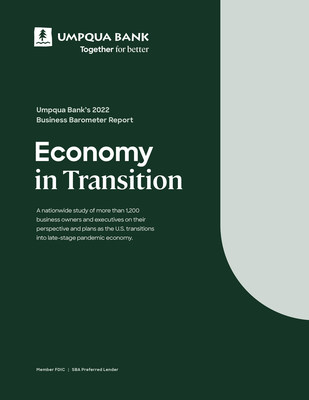Umpqua Bank's 2022 Business Barometer: In Rapidly Changing Economy, Business Leaders Pivot as Inflation, Workforce Transformation Test Resiliency
Umpqua Bank has released its 2022 Business Barometer, revealing significant challenges for small and middle-market businesses in the U.S. 73% of small businesses cite inflation as a primary concern, while 90% are affected by rising costs. Additionally, 72% of middle-market companies struggle to find talent. The report indicates a shift toward major operational changes to combat these issues. Notably, 45% of middle-market firms faced cyber-fraud, highlighting cybersecurity needs. Despite diminished economic optimism, the potential for growth remains as businesses adapt to these evolving challenges.
- Small businesses are now ready to make significant operational changes, indicating adaptability.
- Middle market companies are focusing on workforce transformation and investing in employee retention strategies.
- The report reveals that middle market companies are successfully implementing new inventory management techniques, improving their supply chain management.
- Inflation is a top concern for 73% of small businesses, impacting operational costs.
- The labor shortage continues, with 72% of middle market companies struggling to find qualified employees, affecting growth.
- Cybersecurity threats are increasing, with 45% of middle market companies reporting cyber-fraud incidents.
Insights
Analyzing...
Small Businesses Act with Sense of Urgency, Ready for Significant Changes
73% rank inflation as a top concern90% impacted by soaring costs of goods
Middle Market Companies Zero-in on Impacts of Labor Shortage, Cybersecurity
72% having difficulty finding talent45% have been target of cyber-fraud last 12 months
PORTLAND, Ore., June 21, 2022 /PRNewswire/ -- Umpqua Bank, a subsidiary of Umpqua Holdings Corporation (NASDAQ: UMPQ), today released its annual 2022 Business Barometer, an in-depth study into the mood, mindset, and strategic priorities of leaders at small and middle market companies across the United States. This year's report finds small and middle market businesses pivoting from recent pandemic-era strategies as they face mounting pressures that now include rising inflation and interest rates, in addition to accelerating challenges associated with supply chain disruption and workforce transformation.
Introduced in 2019, Umpqua Bank's Business Barometer report provides insight into how business leaders have navigated an unprecedented period that includes the pre-COVID economy, the pandemic's onset and initial recovery, and the current environment of rising inflation and interest rates. Within that context, Umpqua Bank's 2022 Business Barometer reveals important differences from previous years. This year finds more small companies are ready than ever before to make significant changes to their business in response to inflation's growing impact. Meanwhile, after two years of making larger-scale business changes in response to the pandemic, middle market companies are now tackling the compounding impacts and higher costs of workforce transformation and cybersecurity threats.
"The past few years represent a remarkable period of disruption and resilience for U.S. businesses," said Umpqua Bank President Tory Nixon. "The pre-pandemic economic environment of low-inflation, low-cost capital, and high growth has shifted, and we find ourselves in a period of rising costs for goods, talent and capital. As this new reality sets in, small and middle market companies alike are applying lessons learned over the past couple years and adjusting their strategic focus to ensure they emerge on the other side stronger and more competitive."
Key findings and highlights from Umpqua Bank's 2022 report include:
After Two Years of Successful Pivots, Middle Market Zeros-In on Workforce Transformation
Middle market companies represent just
Instead, middle market companies are shifting focus to address workplace transformation and its accompanying labor shortage, which continue to accelerate. Nearly three-quarters (
"Middle market companies have done a tremendous job of pivoting their businesses to adapt to supply chain and other challenges to become even more efficient and competitive over the past couple years," said Richard Cabrera, Umpqua's Head of Middle Market Banking. "They're now looking to apply that same strategic focus and creative energy to the challenging workforce environment, which has the most immediate impact to their bottom line and is affecting growth."
Small Businesses Poised for Most Significant Changes to Business Since Pandemic
Smaller companies often have fewer levers to pull in response to disruption than larger companies, and past Business Barometer reports have indicated more hesitation to embrace major changes. This year, that trend has reversed. For the first time, small enterprises are looking to make more significant changes to their business, especially compared with a year ago. Changes small businesses anticipate include: pricing models (+18 percentage points), products and services (+12), financing expansion (+7), digitizing for efficiency (+5), and acquiring (+4) or merging (+3).
In the face of continued workforce and supply chain disruption, more small businesses than last year report planning aggressive action to hire for new skills to build capabilities (+13),) increase worker pay and benefits (+12), allow remote work options (+2), find new suppliers (+12), and identify other partners to manage supply chain impacts (+4).
"Increasingly, small businesses now feel a sense of urgency to make changes to their strategy and operations, especially in response to rising inflation, which has a more immediate impact the smaller the enterprise," said Ashley Hayslip, Umpqua's Head of Community & Business Banking, "That sense of urgency can be turned into a competitive advantage for those businesses that pivot quickly and strategically."
Economic Optimism Diminishes, but Expectations for Business Growth Remain Steady
Last year's economic optimism surged beyond pre-pandemic levels as businesses anticipated the recovery. In 2022, that optimism has diminished as concerns increase that rising inflation, which ranks as a top concern for both small (
Leaders' economic outlooks vary significantly based on business size and complexity. Nearly
It's important to note that although leaders report more cautious views of the overall economy, that doesn't equate to a lack of confidence in their ability to adapt and continue to grow their businesses. When asked about revenue growth and profitability, businesses expect levels of increase similar to previous years.
Cybersecurity Ranks as a Major Concern for Middle Market Companies
A noteworthy
Supply Chain Impacts Intensify for Small Businesses, Moderate for Middle Market
This year's report shows the dramatic advances middle market companies have made in aggressively dealing with supply chain disruption. Over the past year,
In contrast, supply-chain impacts are intensifying for smaller businesses compared to last year, particularly in the cost of purchased goods, with
To read and download the survey in full, visit www.umpquabank.com/business-barometer.
Survey Methodology
The Umpqua Bank 2022 Business Barometer, conducted annually, surveyed 1,210 owners, executives, and financial decision-makers from U.S. small and middle-market companies. The online survey was conducted in partnership with DHM Research, a public policy and business research firm, and targeted leaders at companies with
About Umpqua Bank
Umpqua Bank, headquartered in Roseburg, Ore., is a subsidiary of Umpqua Holdings Corporation and operates in Arizona, California, Colorado, Idaho, Nevada, Oregon, and Washington. Umpqua Bank has been recognized for its innovative customer experience and banking strategy by national publications including The Wall Street Journal, The New York Times, BusinessWeek, Fast Company and CNBC. The company has been recognized for eight years in a row on FORTUNE magazine's list of the country's "100 Best Companies to Work For," and was recently named by The Portland Business Journal the Most Admired Financial Services Company in Oregon for the 17th consecutive year. In addition to its retail banking presence, Umpqua Bank also owns Financial Pacific Leasing, Inc., a nationally recognized commercial finance company that provides equipment leases to businesses.
![]() View original content to download multimedia:https://www.prnewswire.com/news-releases/umpqua-banks-2022-business-barometer-in-rapidly-changing-economy-business-leaders-pivot-as-inflation-workforce-transformation-test-resiliency-301570639.html
View original content to download multimedia:https://www.prnewswire.com/news-releases/umpqua-banks-2022-business-barometer-in-rapidly-changing-economy-business-leaders-pivot-as-inflation-workforce-transformation-test-resiliency-301570639.html
SOURCE Umpqua Holdings Corporation










